What if every time you met a new person, every time the phone rang, or even every time you went to a social gathering, there was a good chance that you would soon be revisiting the most traumatic moment of your life? Would you pick up the phone? Would you leave your home?
For Yousef, a 2005 Palestinian Seed from Gaza and 2019 GATHER Fellow, he’s now been making that choice every day for nearly half of his life. In countless interviews, essays, lectures, and his memoir, Yousef has told and retold the story of how, at just 15, a bullet came to be permanently lodged in his spine, and how he came to forgive the Israeli soldier who put it there.
The first time he publicly spoke about it was at Camp, his wound still so fresh that, as he told Seeds of Peace in 2018, a rigorous game of street hockey caused it to reopen and required medical attention. He then shared that Israeli soldiers had occupied the majority of his family’s home in Gaza for five years. They destroyed his family’s farms, riddled the house with bullets, made the majority of the home off limits to his family, killed their donkey for sport, and nearly killed Yousef when an unidentified, unprovoked soldier shot him in the back. And all the while, his father continued to teach peace, to refer to the soldiers as “guests,” and chose to live with his oppressors rather than abandon their family home.
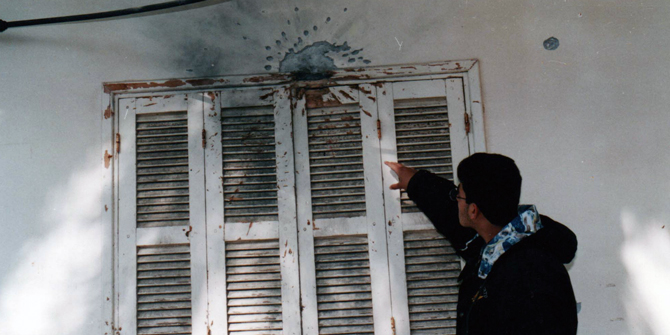
When he was 16, Yousef moved to the U.S. to attend boarding school in Utah and went on to study at Brandeis University in Massachusetts. Since graduating, his career so far has been focused on working for political and social change, including at a think tank that advocates bipartisanship among U.S. Congressional staffers, as a foreign affairs fellow in the office of Senator Bernie Sanders, and as a Manager of Congressional Affairs for the Chief Representative of the Palestinian Liberation Organization to the United States. And now, he is hoping to put a face and name to the Palestinian people, so that what he learned from his father, and experienced as a child, will not be in vain.
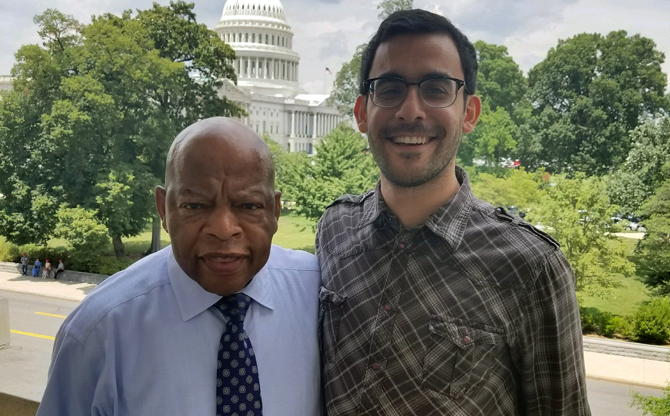
“I am passionate about presenting an authentic Palestinian story to the world,” Yousef said. “I believe in peace because I am a Palestinian born and raised in Gaza. I do not want to fight; I just want to be heard by friends and enemies.”
In a recent phone interview with Seeds of Peace, Yousef shared about the process of publishing his book, “The Words of My Father: Love and Pain in Palestine,” which came out in the U.K. last fall and the U.S. in May, of what it’s like to share his story with audiences, the complexities he faces as an advocate for peace, and his hopes for the future. The questions and responses have been edited and condensed for clarity.
Seeds of Peace: How did this book come to be? You wrote that your father told you to tell your story, but when did you know you had to put it into a book?
Yousef: When I knew that I wasn’t going to be able to go to his funeral. It was probably my sophomore year in college, and I couldn’t go home, and I realized I was never going to see him again. I must have done a hundred, or maybe even more drafts, just writing over and over and over and over. I was lucky because someone, finally, was serious about wanting to work with me and helped me find an agent who would pitch it. Everyone said no in the beginning. Over the whole process, my English had to improve, I had to read a lot of books and memoirs. But it’s been a dream of mine for five years and I know how much I believed in it despite how difficult it was to get published.
Seeds of Peace: Being a Seed, and a Palestinian individual who can picture a future of coexistence, is kind of a difficult position to be in. What is the reaction that you usually get when you express your opinions on the conflict?
For most people, be it Israelis and/or Palestinians or Americans, they will tell me, “I very much respect you and your opinion,” even if they don’t agree. So, I’ve never had a negative experience, although occasionally you will get someone who will do the blame game and say, “why aren’t all the Palestinians peaceful like you?” This is sad because I’m peaceful because I was born and raised by Palestinians.
Seeds of Peace: It has to be incredibly difficult to keep reliving this day over and over, how do you keep telling your story when it was such an emotional experience?
It’s become like family. I mean, how do you always go back to family even though they drive you nuts sometimes? It becomes a part of you, and that’s one. Two, it brings me closer to my dad. I feel that I am keeping him alive every time I tell it, and I’ve mentioned his name pretty much everyday on so many occasions. Not just on the train or to my friends, but on college campuses and before people, and at dinners, at conferences, at events, and briefings. So he’s very much alive to me because of that experience.
It also helps me to deal with the emotions and to carry on despite the difficulties of the whole thing. It can be exhausting, but the bullet is there in my back and it is always a choice. I could just say, “I’ve got pain. I’m going to sit at home. This small event is not worth it.” Or I could be speaking and hopefully giving one more chance for peace and reconciliation in Israel, Palestine, and around the world. I have never once said no to any event, small or big, just simply because of that, because I would feel almost embarrassed before my dad. I think he would tell me, “you’re going to have the pain anyway, why don’t you just invest it in peace then?” And that’s what I think I’ve been doing.
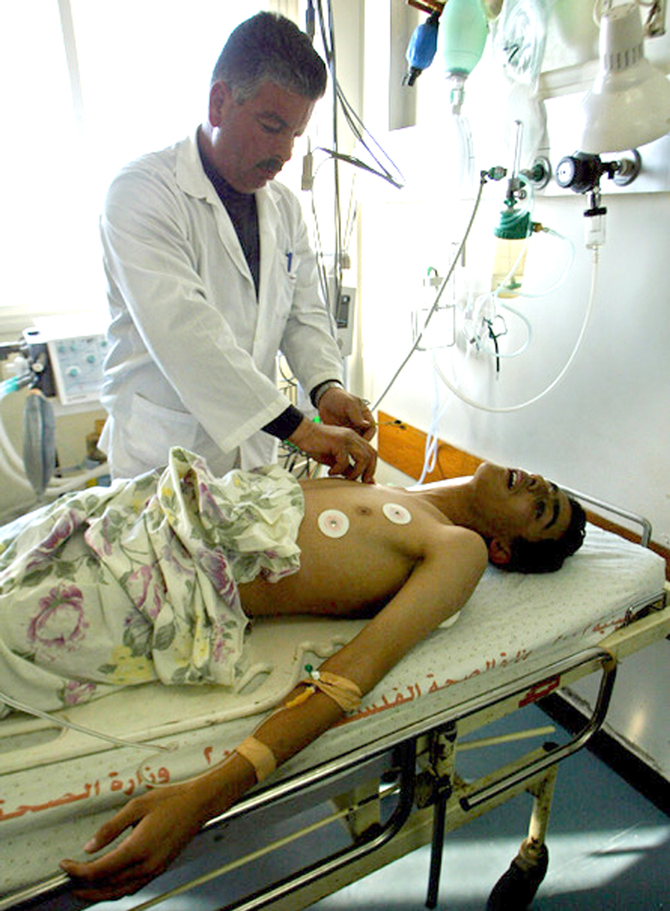
Seeds of Peace: With each telling you’re meeting new people and traveling around. What new things have you learned from your audiences?
For those who live in Palestine or in Israel, they think that Americans don’t care about what’s going on there. And many Americans don’t know, but are curious. There’s especially a lot of passion and eagerness to learn among the Jewish students and audiences around the U.S. Regardless of where they stand, they are incredibly passionate about the whole subject. And for me, to come and see that people are incredibly interested in working to make the situation better, that’s a valuable thing for me to learn and take with me.
Also, when you just walk around with your own story, you think that you’re the only story, and every time I speak, someone will be just as brave and just as courageous to stand up and talk about what they’ve gone through, and what challenges they have to overcome. And that reminds me that I am hopefully giving that person a chance to express themselves and to know that they can also do what I just did: stand up and tell my story.
Seeds of Peace: The first time you shared your story was at Camp. What is your strongest memory of your time there?
I’ll give you two. One is when I first discovered pancakes. I thought it was the most incredible thing ever.
The second is when I first spoke. I’d never stood up in front of strangers and when I shared my story in front of the campers, their reactions gave me a sense of a mission, a commitment. I said that if I can live with soldiers for five years, be shot, you know, in a wheelchair, and if someone is able to go through such things and still be able to forgive, I hope that that still complicates it even more for Palestinians and Israelis who feel that we have no chance of ever living together in Israel/Palestine.
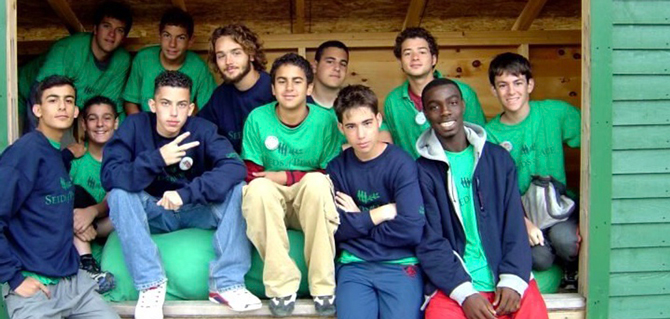
Seeds of Peace: You said as your GATHER platform that you want to be a voice for Palestinians. What do you want to tell people about Palestinians that they aren’t hearing elsewhere?
That everything that I believe and all my values and principles come straight from Gaza, and therefore my country and my people should be subjugated no more, should be denied no more. We should not be in constant fear. I want to present a legitimate voice of my people in a human way. There are so many issues that, when I lived in Gaza, I thought were only issues that the Palestinians had. But when I came to the U.S., I saw that there’s conflict, poverty, and inequality here, too. And I want to remind people that I’m not just a political thing. I’m not a threat. I’m not going to do harm.
Seeds of Peace: Do you ever feel guilty that you left Palestine? That you had the opportunity to get out while others did not?
Every day. That’s why I do what I do because I’m trying to make it count. Every day that I got to spend in this country, I treated it as it was my last day, especially when I was on a student visa. I was always on a mission. I knew that I always needed to make everything that came my way count. Because if I make it, and hopefully I do, then other kids from Palestine, and the world who are going through such circumstances, will still find the light and hope to do something interesting and powerful with their lives.
Seeds of Peace: You’ve been living with this story now for about half your life. How does it continue to motivate you to work for peace?
I’m never going to give up because that’s the whole point of my dad, that we are never going to let the actions of others, right or wrong, determine what kinds of human beings we will be. And though there’s still war in my country, I feel even more dedicated to just stay true to my message and learn. I will study books, I will read, I will meet all people, including the ones who disagree with me, and try to understand where they are coming from and to educate myself as much as possible, because that makes for a truly fulfilling life.
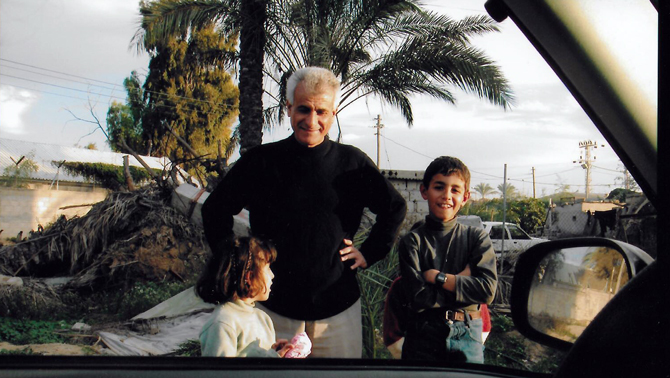
Seeds of Peace: What do you say to people who say that peace is impossible? Or that too much damage has been done?
For five years I watched my dad be mistreated by soldiers. I watched them takeover his house. And after all that, I remember how I was forever sold because he won. He didn’t leave, they didn’t demolish the house—he paid a price, but he didn’t become a refugee. Of course, Palestine is still under occupation, but I just saw in that little circle, that little point on planet Earth, I saw soldiers and I saw my dad. I didn’t see TV, I didn’t see big issues, and propaganda and media, it was just with my own eyes, and he got the house back. It still is the most incredible thing I’ve ever witnessed. So, when someone says peace is impossible, I would like to remind them of the moment after the soldiers finally left, that my dad went upstairs and said to us, “I told you I was going to get the house back.”
Seeds of Peace: With the platform given to you by your book and by being a GATHER Fellow, what do you hope to achieve in the long run?
I hope to be someone who is able to change lives and to help those who need help. I hope to be there by a good leader’s side who’s trying to make the world a better place. And to write another book.
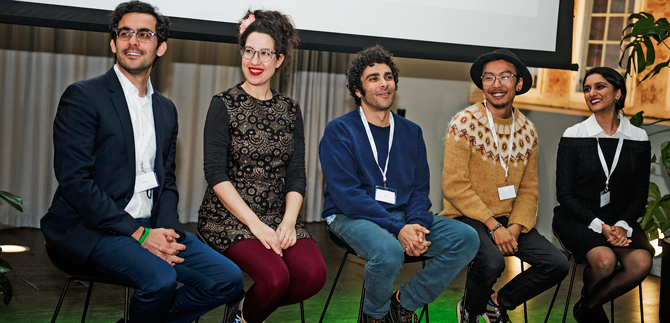
This series highlights our 2019 GATHER Fellows. To learn more about the inspiring social change that Yousef and our other Fellows are working towards, check out #FollowtheFellows on Facebook, Twitter, and Instagram.

